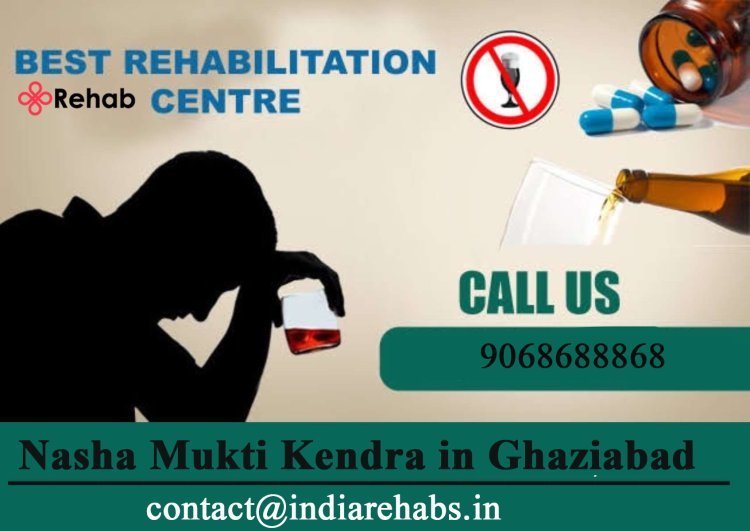How Yoga Supports Addiction Recovery: Insights from Nasha Mukti Kendra in Ghaziabad
Addiction recovery is a challenging yet rewarding journey that requires a holistic approach to healing. While traditional treatments such as therapy, medication, and rehabilitation programs play a crucial role, alternative practices like yoga have also gained recognition for their positive impact on the recovery process.

Addiction recovery is a challenging yet rewarding journey that requires a holistic approach to healing. While traditional treatments such as therapy, medication, and rehabilitation programs play a crucial role, alternative practices like yoga have also gained recognition for their positive impact on the recovery process. At Nasha Mukti Kendra in Ghaziabad, we incorporate yoga into our treatment plans to help individuals struggling with addiction achieve a more balanced and sustainable recovery.
The Role of Yoga in Addiction Recovery
Yoga is more than just a physical practice; it’s a mind-body connection that helps cultivate mindfulness, self-awareness, and emotional balance. When integrated into addiction recovery, yoga offers a range of benefits that can enhance the healing process and promote long-term sobriety.
1. Reduces Stress and Anxiety
One of the most common triggers for substance use is stress and anxiety. Yoga techniques, such as deep breathing exercises (pranayama) and meditation, help regulate the nervous system, reduce stress, and induce a state of calm. This can be particularly beneficial for individuals in recovery who may experience heightened anxiety or emotional instability as they navigate life without substances.
2. Enhances Emotional Regulation
Addiction often stems from an inability to cope with negative emotions such as anger, sadness, or fear. Yoga helps individuals reconnect with their emotions in a safe and controlled manner. Through mindful movements and meditative practices, individuals learn to observe their thoughts and feelings without judgment, which improves emotional regulation and resilience.
3. Promotes Physical Health
Substance abuse can take a toll on the body, leading to physical ailments such as poor circulation, muscle tension, and weight fluctuations. Yoga helps improve flexibility, strength, and overall physical health. By restoring physical well-being, individuals can feel more energized and motivated to continue their recovery journey.
At Nasha Mukti Kendra, our yoga sessions focus on gentle, restorative practices that help individuals regain strength and vitality.
4. Cultivates Mindfulness
Mindfulness, or the practice of staying present in the moment, is a cornerstone of yoga. By incorporating mindfulness into recovery, individuals can become more aware of their thoughts, cravings, and behaviors, allowing them to make healthier decisions. This awareness is vital in preventing relapse, as it helps individuals recognize early warning signs and triggers that may lead to substance use.
5. Builds a Strong Support System
Incorporating yoga into the recovery process not only fosters self-awareness but also creates a sense of community. Group yoga sessions at Nasha Mukti Kendra in Ghaziabad offer a supportive environment where individuals can connect with others going through similar experiences. This shared journey helps reduce isolation and builds lasting relationships that contribute to long-term sobriety.
6. Encourages Self-Discipline and Focus
Yoga requires commitment and consistency, qualities that are crucial in the recovery process. Regular practice helps individuals develop a sense of discipline and focus, which can carry over into other areas of life, such as work, relationships, and personal growth. By maintaining a structured yoga routine, individuals in recovery can build a strong foundation for lasting change.
7. Reduces the Risk of Relapse
Research has shown that individuals who incorporate yoga into their recovery are less likely to relapse. Yoga’s emphasis on self-care, mindfulness, and emotional well-being helps individuals develop the tools necessary to manage cravings, triggers, and challenging emotions. This makes yoga an invaluable tool for relapse prevention and long-term sobriety.
Why Choose Nasha Mukti Kendra in Ghaziabad?
At Nasha Mukti Kendra, we understand the importance of a holistic approach to addiction recovery. Our experienced team integrates yoga into our comprehensive treatment plans, offering personalized care that addresses the physical, emotional, and psychological aspects of recovery.
Whether you’re new to yoga or experienced in the practice, our sessions are designed to accommodate all levels and help you unlock the healing potential within your mind and body.
Final Thoughts
Yoga is a powerful tool that supports addiction recovery by promoting physical, emotional, and mental well-being. At Nasha Mukti Kendra in Noida, we believe in the transformative power of yoga and its ability to guide individuals toward lasting sobriety and a healthier, more balanced life.
If you or a loved one is struggling with addiction, consider exploring the benefits of yoga as part of a comprehensive treatment plan. Reach out to Nasha Mukti Kendra today and take the first step toward a brighter future.
What's Your Reaction?











